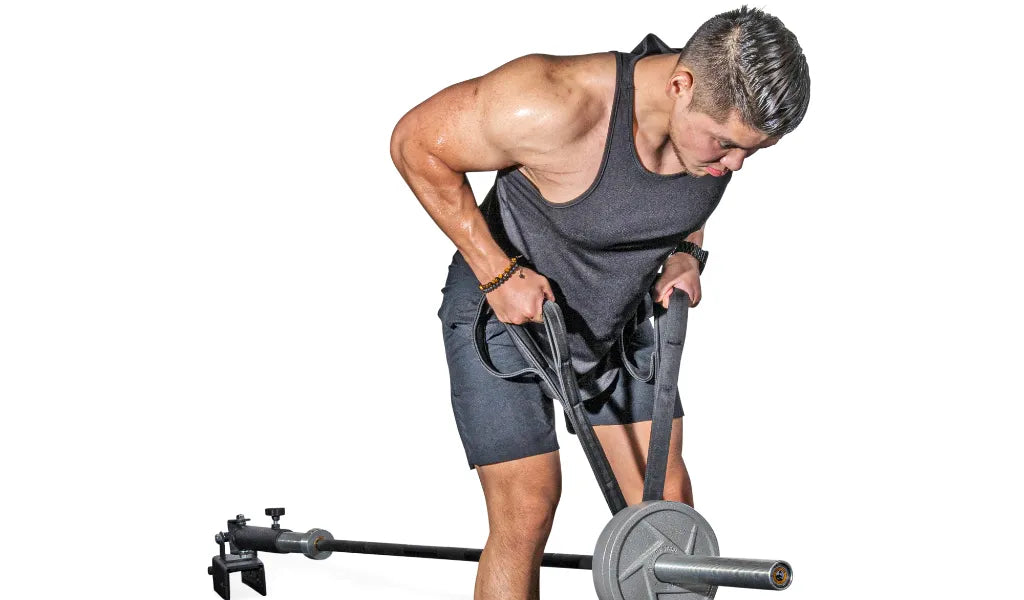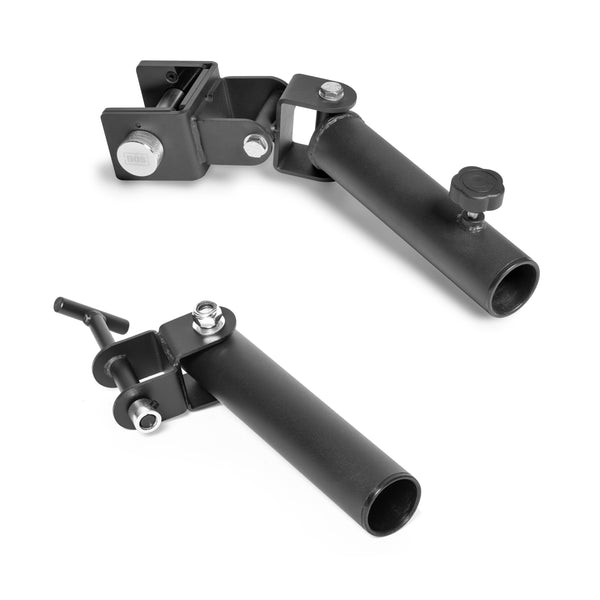So, you've got your lifting straps or tricep strap in hand and are ready to take your rowing game to the next level. But you're wondering: Can you really do rows with straps? And, more importantly, should you?
Let's dive into the world of rows with straps, why they can be a game-changer for your back day, and how to execute them like a pro.
Can You Do Rows with Straps?
Absolutely! Rows and straps go together like peanut butter and jelly—only this combo is for those looking to up their lifting game rather than their calorie intake.
Using straps during rows can be particularly beneficial if you're struggling to maintain a firm grip as the weights get heavier or if you're looking to focus more on muscle engagement without worrying about your grip giving out halfway through a set.
Benefits of Doing Rows with Straps
Let's be honest: rows are one of the best exercises for building a thick, strong back. But when you start lifting some serious weight, your grip can sometimes be the weakest link.
Enter lifting straps. By taking your grip out of the equation, straps allow you to focus entirely on the muscles you're trying to target. This means better muscle engagement, more control during the lift, and the ability to push yourself further without worrying about dropping the bar.
For anyone who's found their grip failing before their back muscles are fully cooked, straps can be a game-changer. They help you maintain proper form, reduce the risk of injury, and allow you to lift heavier weights, making them a must-have in your gym bag.
How to Do T-Bar Rows with Straps
T-bar rows are a staple for building a thick, powerful back. Adding straps into the mix can help you lift heavier and maintain better control throughout the movement.
Here’s how to do T-bar rows with straps:
- Set up your T-bar row: Load the desired weight onto the barbell. Place the end of the barbell into a landmine attachment or secure it in a corner.
- Attach the straps: Loop your lifting straps around the handles or bar where you’ll be gripping. Ensure they're tight and secure.
- Get into position: Stand over the bar with a shoulder-width stance, bend at the hips and knees, and grab the handles or bar with your strapped hands.
- Engage your core: Keep your back straight and core tight as you lift the barbell off the ground slightly.
- Row the weight: Pull the barbell towards your torso, focusing on squeezing your shoulder blades together at the top of the movement. The straps should help you maintain a firm grip, allowing you to focus on pulling with your back muscles.
- Lower the weight: Slowly lower the barbell back to the starting position, maintaining control throughout the movement.
- Repeat: Perform your desired number of reps, ensuring each row is controlled and deliberate.
How to Do Cable Rows with Straps
Cable rows are another fantastic exercise for developing your back, and straps can help ensure you’re maximizing your time under tension without worrying about grip fatigue.
Here’s how to do cable rows with straps:
- Set up the cable machine: Attach your straps to the low pulley of a cable machine.
- Get into position: Sit down on the machine, feet braced against the footrests, and grasp the straps. Your knees should be slightly bent, and your torso should be upright.
- Engage your core: Keep your back straight and your core tight.
- Row the weight: Pull the straps towards your abdomen, focusing on bringing your shoulder blades together. The straps will help you maintain a solid grip, allowing you to concentrate on using your back muscles. Keep those elbow tucked!
- Control the return: Slowly extend your arms, allowing the weight to return to the starting position in a controlled manner.
- Repeat: Complete your set with controlled, deliberate movements, ensuring each rep counts.
How to Do Barbell Rows with Lifting Straps
Barbell rows are a classic exercise for building a strong, muscular back. But when the weights get heavy, your grip might start to give out before your back muscles do. That’s where lifting straps come into play. Using straps can help you focus on pulling more weight and fully engaging your back muscles without worrying about your grip strength.
Here’s how to do barbell rows with lifting straps:
- Set up the barbell: Load the barbell with your desired weight and place it on the floor. Stand over the barbell with your feet shoulder-width apart.
- Attach the straps: Loop your lifting straps around the barbell, wrapping them tightly around the bar. Make sure they’re secure and that your hands are gripping the straps firmly.
- Get into position: Bend at the hips and knees, keeping your back straight and your core engaged. Your upper body should be angled slightly forward, with your hands gripping the barbell just outside of your knees.
- Initiate the lift: Begin the row by pulling the barbell towards your lower chest or upper abdomen. Focus on driving your elbows back and squeezing your shoulder blades together at the top of the movement.
- Lower the weight: Slowly lower the barbell back to the starting position, maintaining control throughout the movement. Your straps will help you maintain a solid grip as you control the weight.
- Repeat: Perform your desired number of reps, making sure each row is controlled and deliberate. The straps should allow you to focus on fully engaging your back muscles without grip fatigue holding you back.
Going lighter than you think and prioritizing form is a must with barbell rows, even with your handy dandy lifting straps.
FAQs About Using Straps for Rows
Q: Can you use straps for any row variation?
A: Yes, straps can be used for most row variations, including barbell rows, dumbbell rows, T-bar rows, and cable rows. The key is to make sure you're using them to enhance your workout rather than relying on them as a crutch for poor grip strength.
Q: When should you start using straps?
A: Consider using straps when your grip starts to fail before your target muscles during rows. They're especially helpful as you begin to lift heavier weights and want to maintain proper form.
Q: Are straps cheating?
A: Absolutely not! You were on a break! Straps are a tool, just like any other piece of equipment in the gym. They allow you to lift heavier and more effectively target your muscles. Just don’t forget to also work on your grip strength to ensure balanced development.
Conclusion
Adding straps to your rowing routine can make a world of difference, particularly as you start lifting heavier weights. They help maintain proper form, allow you to focus on muscle engagement, and can help push past plateaus. Whether you’re performing T-bar rows or cable rows, straps can help you get the most out of your workout.
Summary of Key Points
- Straps help maintain a strong grip during heavy rows.
- They allow for better muscle engagement by taking grip strength out of the equation.
- Straps can be used for various row variations, including T-bar rows and cable rows.
- Focus on form and muscle engagement with the help of straps.




